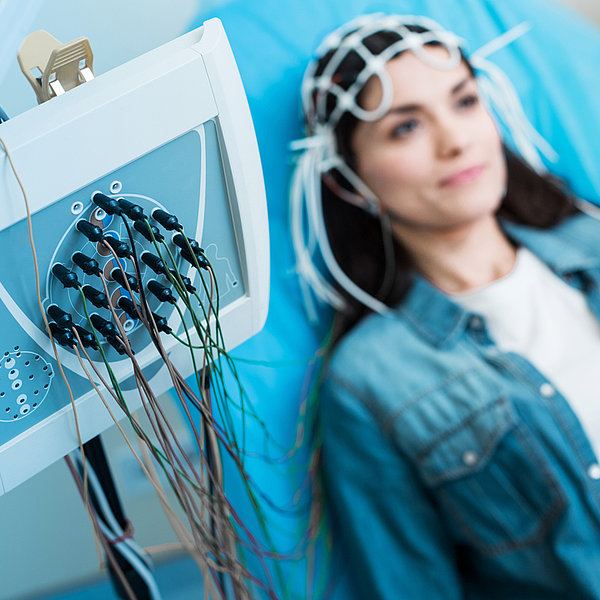Bisherige Preisträgerinnen und Preisträger:
2023
Valentina Kreuz (Universität of Hamburg)
Krenz, V., Sommer, T., Alink, A., Roozendaal, B., & Schwabe, L. (2021). Noradrenergic arousal after encoding reverses the course of systems consolidation in humans. Nature Communications, 12(1), 6054. https://doi.org/10.1038/s41467-021-26250-7
2022
Anne Kühnel (Max Planck Institut für Psychiatrie München)
Kühnel, A., Czisch, M., Sämann, P. G., BeCome Working Group, Binder, E. B., & Kroemer, N. B. (2022). Spatiotemporal dynamics of stress-induced network reconfigurations reflect negative affectivity. Biological Psychiatry, 92(2), 158–169. https://doi.org/10.1016/j.biopsych.2022.01.008
2021
Monja Neuser (Eberhard Karls Universität Tübingen)
Neuser, M. P., Teckentrup, V., Kühnel, A., Hallschmid, M., Walter, M., & Kroemer, N. B. (2020). Vagus nerve stimulation boosts the drive for rewards. Nature Communications, 11, 3555. https://doi.org/10.1038/s41467-020-17344-9
2020
Julina A. Rattel (Paris Lodron Universität Salzburg)
Rattel, J. A., Miedl, S. F., Franke L. K., Grünberger, L. M., Blechert, J., Kronbichler, M., Spoormaker, V. I. & Wilhelm, F. H. (2019). Peritraumatic neural processing and intrusive memories: The role of lifetime adversity. Biological Psychiatry: Cognitive Neuroscience and Neuroimaging, 4(4), 381–389. https://doi.org/10.1016/j.bpsc.2018.12.010
2019
Preis wurde geteilt und an die beiden folgenden Personen vergeben:
Anuck Sawangjit (Eberhard Karls Universität Tübingen)
Sawangjit, A., Oyanedel, C. N., Niethard, N., Salazar, C., Born, J., & Inostroza, M. (2018). The hippocampus is crucial for forming non-hippocampal long-term memory during sleep. Nature, 564, 109–113. https://doi.org/10.1038/s41586-018-0716-8
Lea Himmer (Eberhard Karls Universität Tübingen)
Himmer, L., Schönauer, M., Heib, D. P. J., Schabus, M., & Gais, S. (2019). Rehearsal initiates systems memory consolidation, sleep makes it last. Science Advances, 5(4), eaav1695. https://doi.org/10.1126/sciadv.aav1695
2018
Miriam Sebold (Universität Potsdam, Charité Berlin)
Sebold, M., Nebe, S., Garbusow, M., Guggenmos, M., Schad, D., Beck, A., Kuitunen-Paul, S., Sommer, C., Frank, R., Neu, P., Zimmermann, U., Rapp, M., Smolka, M., Huys, Q., Schlagenhauf, F., & Heinz, A. (2017) When habits are dangerous: Alcohol expectancies and habitual decision-making predict relapse in alcohol dependence. Biological Psychiatry, 82(11), 847–856. https://doi.org/10.1016/j.biopsych.2017.04.019
2017
Svenja Brodt (Eberhard Karls Universität Tübingen)
Brodt, S., Pöhlchen, D., Flanagin, V. L., Glasauer, S., Gais, S., & Schönauer, M. (2016). Rapid and independent memory formation in the parietal cortex. PNAS, 113(46), 13251–13256. https://doi.org/10.1073/pnas.1605719113
2016
Laura Müller (Universitätsklinikum Heidelberg)
Müller, L. E., Schulz, A., Andermann, M., Gabel, A., Gescher, D., M., Spohn, A., Herpertz, S. C., & Bertsch, K. (2015). Cortical representation of afferent bodily signals in borderline personality disorder: Neural correlates and relationship to emotional dysregulation. JAMA Psychiatry, 72(11), 1077–1086. https://doi.org/10.1001/jamapsychiatry.2015.1252
2015
Thomas Schreiner (Universität Zürich)
Schreiner, T., & Rasch, B. (2015). Boosting vocabulary learning by verbal cueing during sleep. Cerebral Cortex, 25(11), 4169–4179. https://doi.org/10.1093/cercor/bhu139
2014
Adrian Georg Fischer (Otto-von-Guericke Universität Magdeburg)
Fischer, A. G., & Ullsperger, M. (2013). Real and fictive outcomes are processed differently but converge on a common adaptive mechanism. Neuron, 79(6), 1243–1255. https://doi.org/10.1016/j.neuron.2013.07.006
2013
Ines Wilhelm (Universität Zürich)
Wilhelm, I., & Rose, M., Imhof, K. I., Rasch, B., Büchel, C., & Born, J. (2013). The sleeping child outplays the adult's capacity to convert implicit into explicit knowledge. Nature Neuroscience, 16, 391–393. https://doi.org/10.1038/nn.3343
2012
Dorit Kliemann (Freie Universität Berlin und Max-Planck-Institut für Bildungsforschung Berlin)
Kliemann, D., Dziobek, I., Harri, A., Baudewig, J., & Heekeren H. R. (2012). The role of the amygdala in atypical gaze on emotional faces in autism spectrum disorders. Journal of Neuroscience, 32(28), 9469–9476. https://doi.org/10.1523/JNEUROSCI.5294-11.2012
2011
Lars Schwabe (Ruhr-Universität Bochum)
Schwabe, L., Tegenthoff, M., Höffken, O., & Wolf, O. T. (2010). Concurrent glucocorticoid and noradrenergic activity shifts instrumental behavior from goal-directed to habitual control. Journal of Neuroscience, 30(24), 8190–8196. https://doi.org/10.1523/JNEUROSCI.0734-10.2010
2010
Falk Eippert (Universitätsklinikum Hamburg-Eppendorf)
Eippert, F., Bingel, U., Schoell, E. D., Yacubian, J., Klinger, R., Lorenz, J., & Büchel, C. (2009). Activation of the opiodergic descending pain control system underlies placebo analgesia. Neuron, 63(4), 533–543. https://doi.org/10.1016/j.neuron.2009.07.014
2009
Ulrike Rimmele (Universität Zürich und New York University)
Rimmele, U., Hediger, K., Heinrichs, M., & Klaver, P. (2009). Oxytocin makes a face in memory more familiar. Journal of Neuroscience, 29(1), 38–42. https://doi.org/10.1523/JNEUROSCI.4260-08.2009
2008
Ulrike M. Krämer (Otto-von-Guericke Universität Magdeburg)
Krämer, U. M., Büttner, S., Roih, G., & Münte, T. F. (2008). Trait aggressiveness modulates neurophysiological correlates of laboratory-induced reactive aggression in humans. Journal of Cognitive Neuroscience, 20(8), 1464–1477. https://doi.org/10.1162/jocn.2008.20103
2007
Björn Rasch(Universität zu Lübeck)
Rasch, B., Büchel, C., Gais, S., & Born, J. (2007). Odor cues during slow-wave sleep prompt declarative memory consolidation. Science, 315(5817), 1426–1429. https://doi.org/10.1126/science.1138581
2006
Margarita Stolarova (Universität Konstanz)
Stolarova, M., Keil, A., & Moratti, S. (2006). Modulation of the C1 visual event-related component by conditioned stimuli: Evidence for sensory plasticity in early affective perception. Cerebral Cortex, 16(6), 876–887. https://doi.org/10.1093/cercor/bhj031
2005
Tobias Kalenscher (Ruhr-Universität Bochum)
Kalenscher, T., Windmann, S., Diekamp, B., Rose, J., Güntürkün, O., & Colombo, M. (2005). Single units in the pigeon brain integrate reward amount and time-to-reward in an impulsive choice task. Current Biology, 15(7), 594–602. https://doi.org/10.1016/j.cub.2005.02.052
2004
Ullrich Wagner (Universität zu Lübeck)
Wagner, U., Gais, S., Haider, H., Verleger, R., & Björn, R. (2004). Sleep inspires insight. Nature, 427, 352–355. https://doi.org/10.1038/nature02223
2003
Susanne Jaeggi (Universität Bern)
Jaeggi, S., Seewer, R., Nirkko, A. C., Eckstein, D., Schroth, G., Groner, R., & Gutbrod, K. (2003). Does excessive memory load attenuate activation in the prefrontal cortex? Load-dependent processing in single and dual tasks: Functional magnetic resonance imaging study. NeuroImage, 19(2), 210–225. https://doi.org/10.1016/S1053-8119(03)00098-3
2002
Manfred Hallschmid (Universität zu Lübeck)
1999
Andreas Keil (Universität Konstanz)
Keil, A., Müller, M. M., Ray, W. J., Gruber, T., & Elbert, T. (1999). Human gamma band activity and perception of a gestalt. Journal of Neuroscience, 19(16), 7152–7161. https://doi.org/10.1523/JNEUROSCI.19-16-07152.1999
Aktuelle Ausschreibung
Die Ausschreibung für den Forschungspreis Biopsychologie 2023 können Sie hier herunterladen. Alle Informationen zu Voraussetzungen und Bewerbung finden Sie im pdf.
